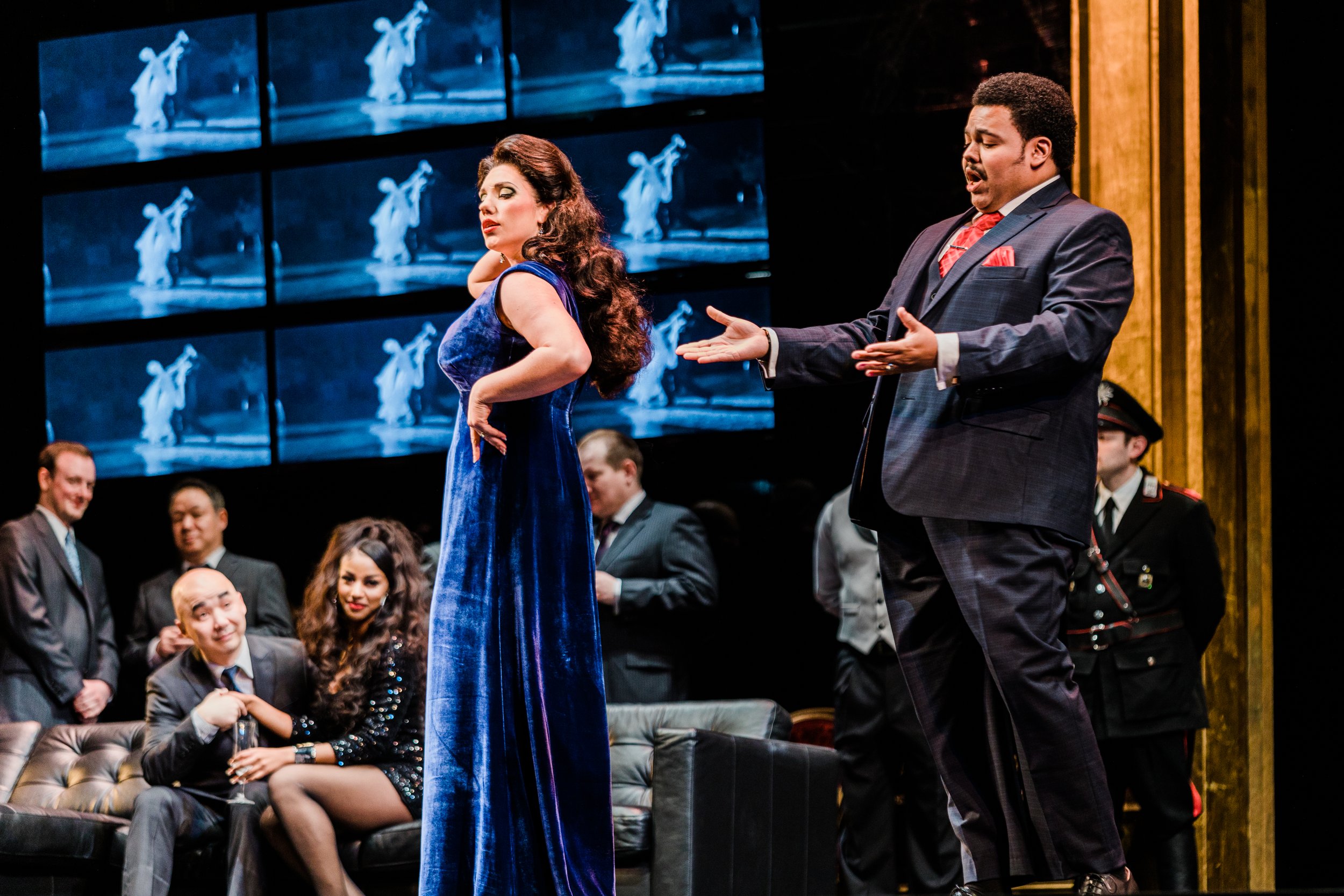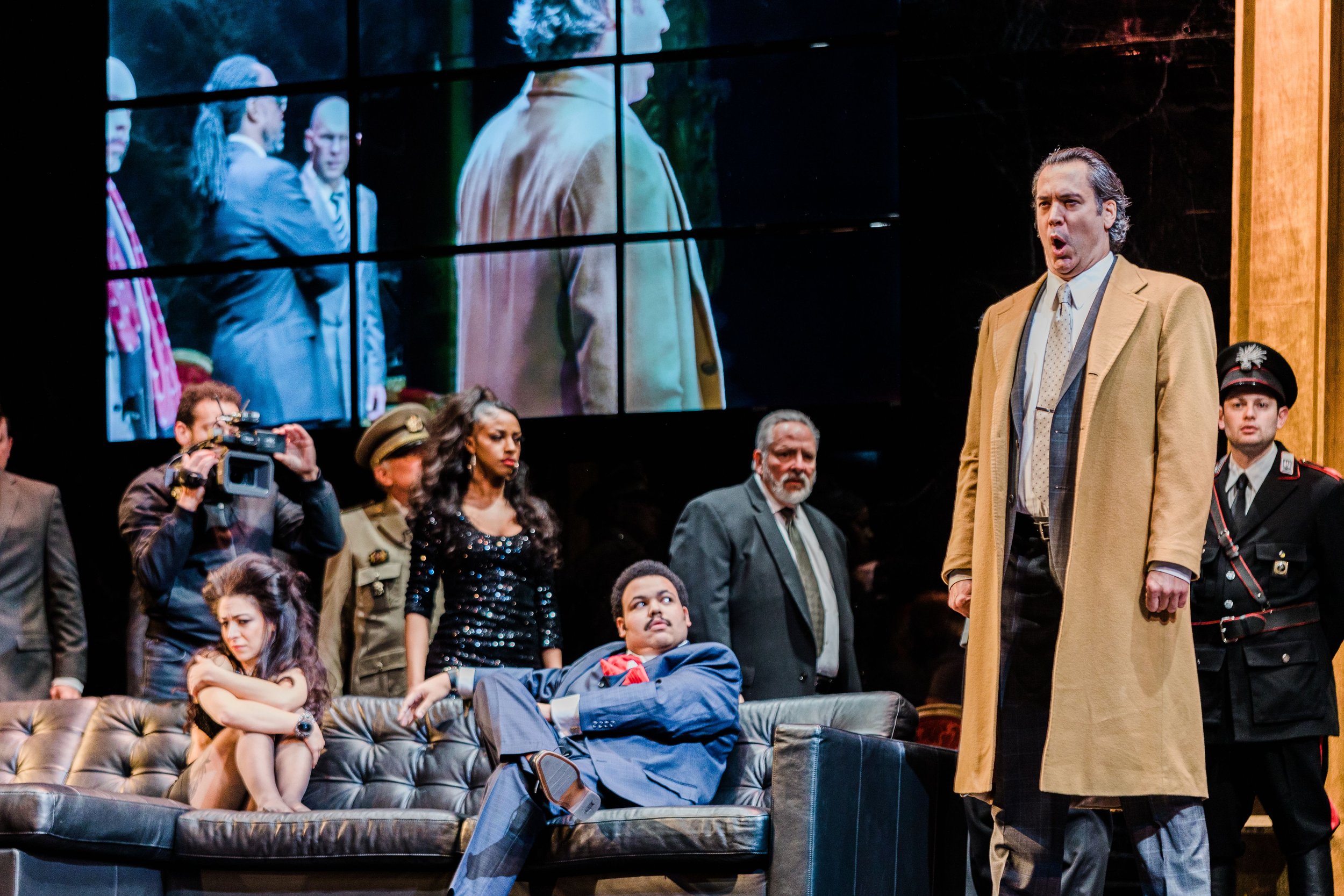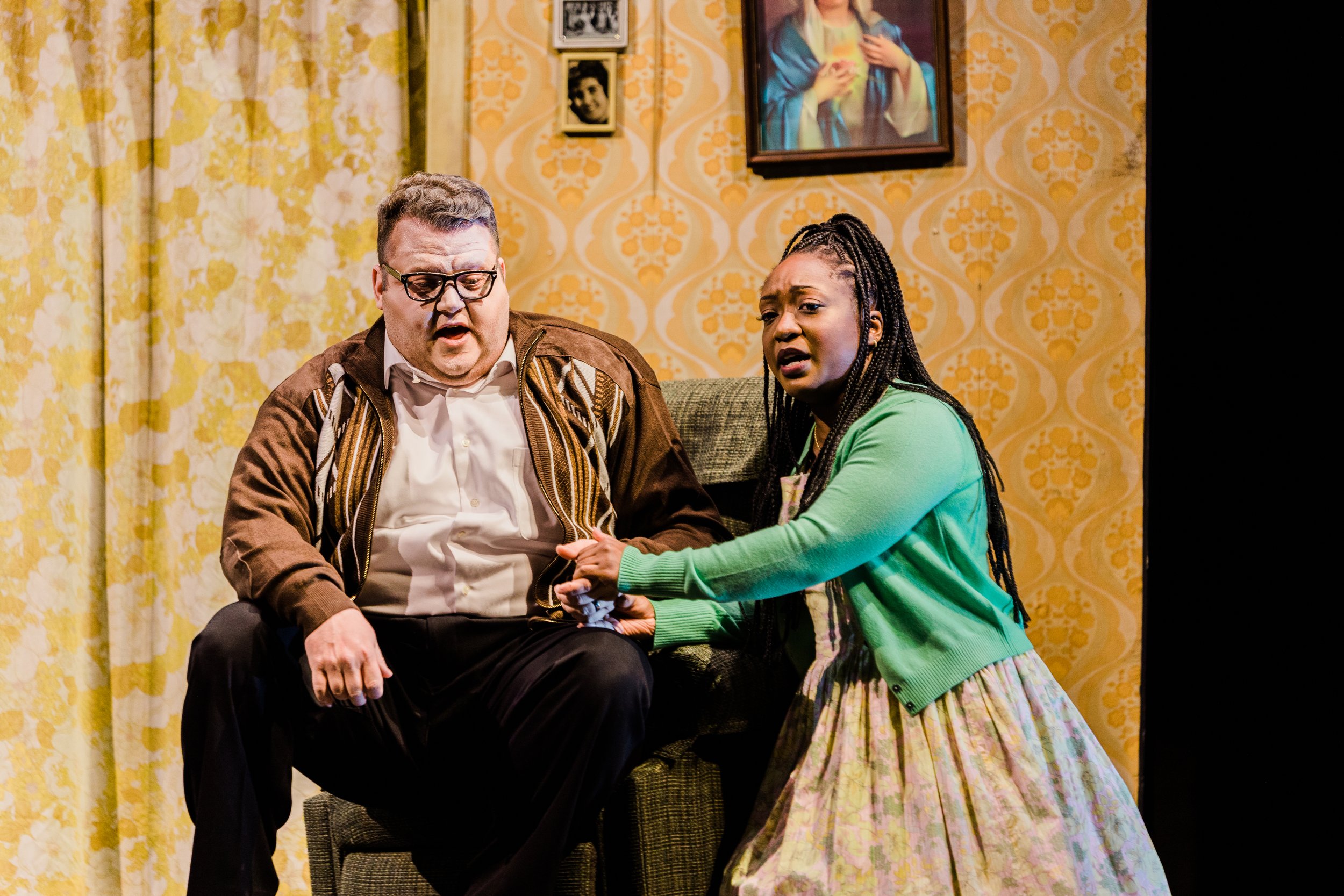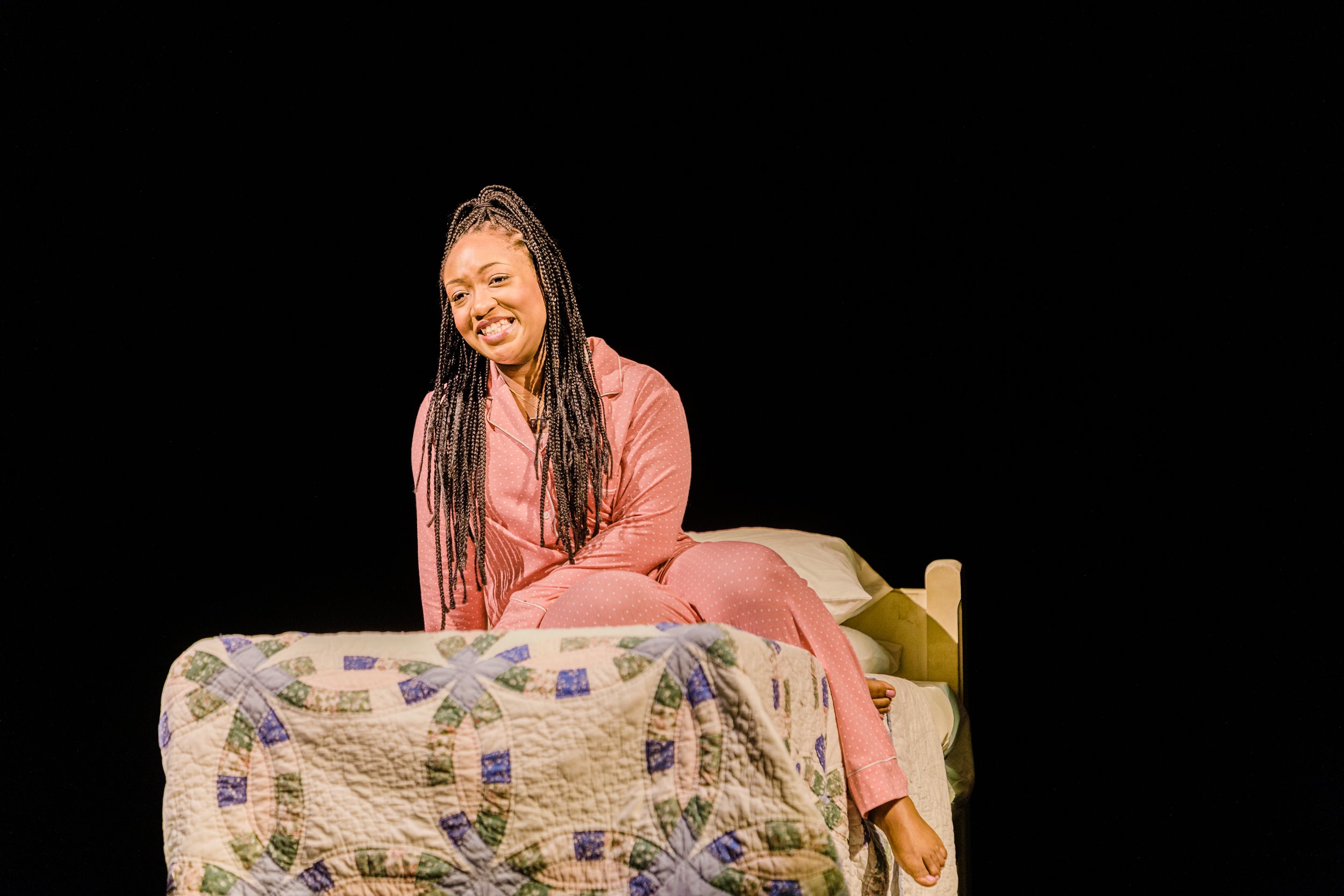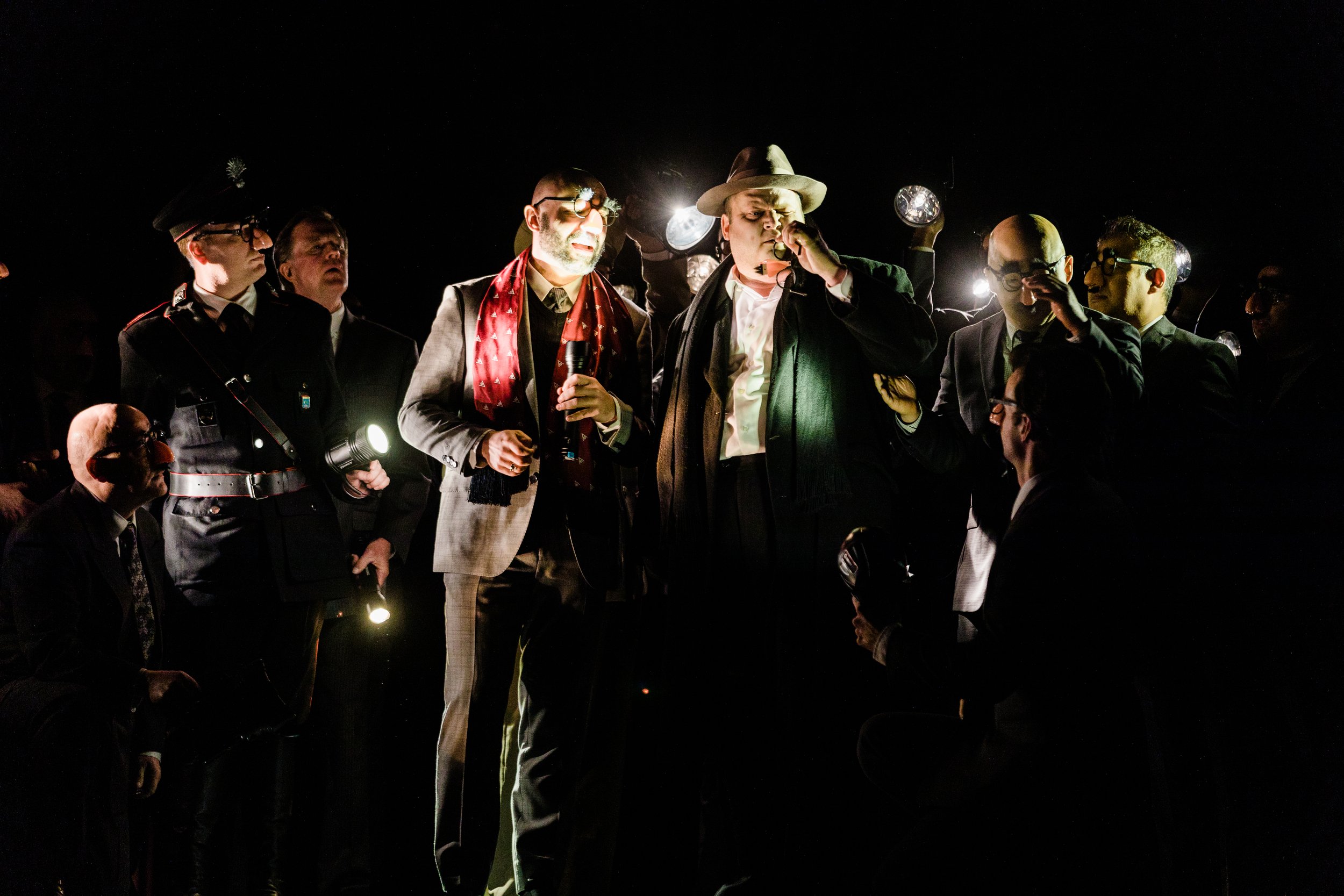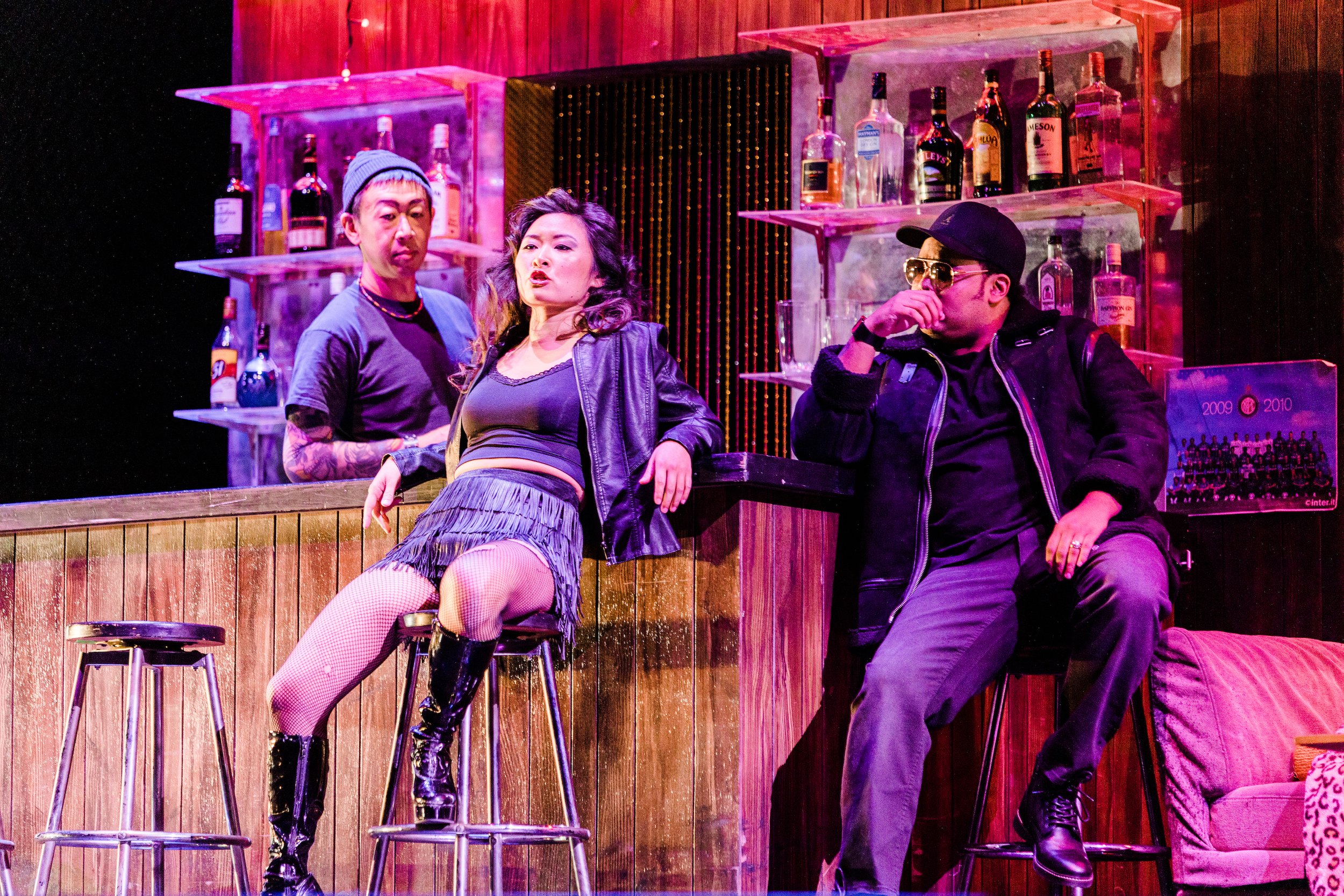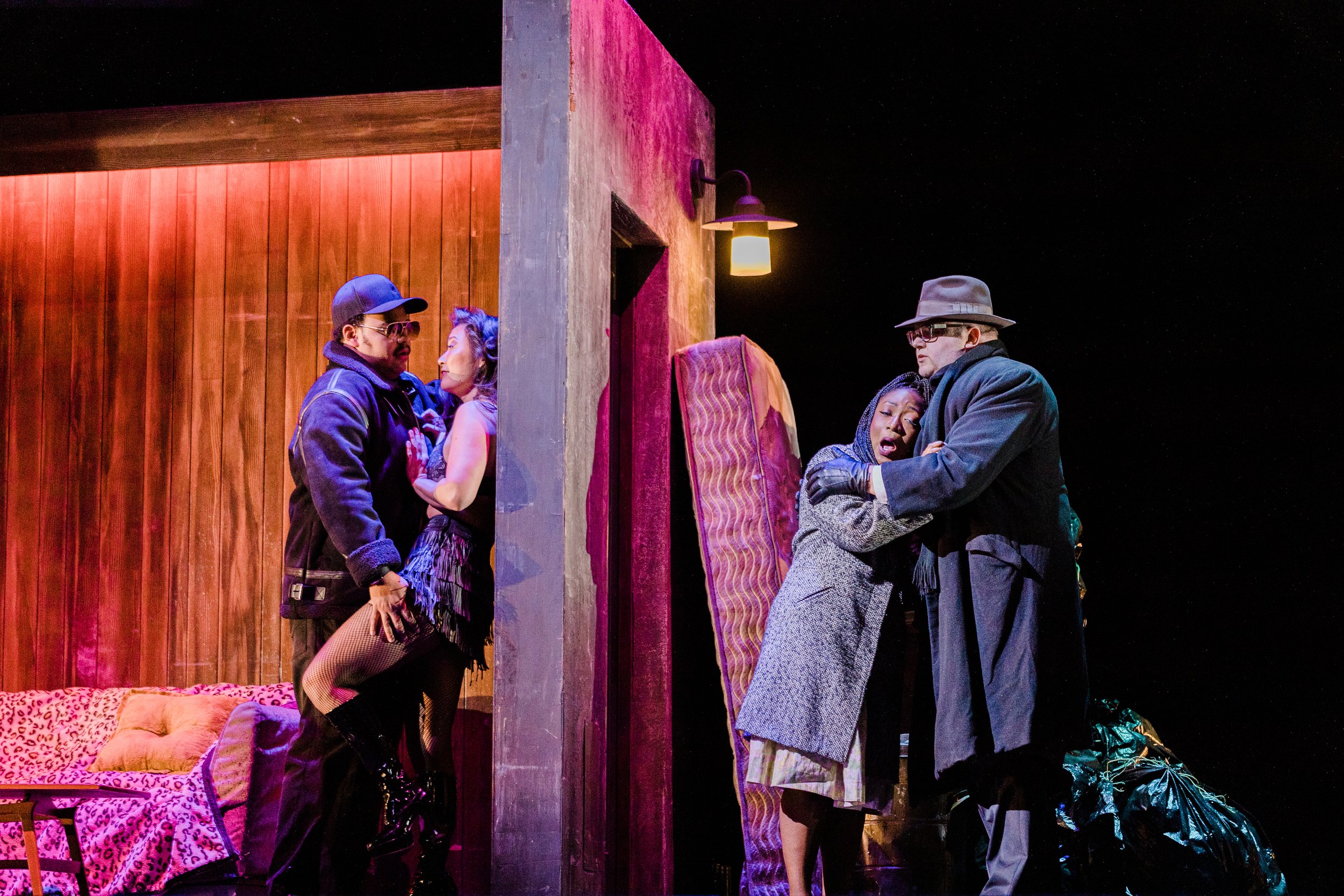Rent, the musical, loosely based on La Boheme has a song titled “525,600 Minutes” where the number refers to the minutes in a year. The last fully staged opera by Opera Philadelphia was 942 days before Friday night’s Rigoletto, or 1,356,480 minutes, over 2.5 years ago. The company used the down time to organize outdoor events, commission new works, initiate and stock their innovative Opera Philadelphia Channel, and stage an oratorio in the Kimmel Center in January. The wildly enthusiastic audience Friday could not have been happier that the wait was over. The audience was obviously appreciative of both the performance and Opera Philadelphia’s return.
Rigoletto (baritone Anthony Clark Evans) sits alone in the Duke of Mantua’s ballroom with a large screen monitor overhead. Photo by Dominic M. Mercier; courtesy of Opera Philadelphia.
OP selected opera meat and potatoes in their comeback production - popular Verdi sung by beautiful voices - but they veered away from a classical production. OP instead chose a modern setting and seasoned it with awareness-raising for misogyny in opera. Verdi’s principal theme of abuse of power in the 19th century was moved forward to the 21st. Rigoletto (1851) is based on an 1832 play by Victor Hugo that caused the power brokers of his day to feel threatened enough to shut it down after one performance. Composer Giuseppe Verdi and his librettist Francesco Piave revised the story just enough to be passable to those in power. OP presented a version by Director Lindy Hume from 2012, which she based on the life of Italian media tycoon and politician Silvio Berlusconi. Other more recent examples could have been used – Jeffrey Epstein, anyone?
left photo: Countess Ceprano (soprano Kara Goodrich) is pursued by the Duke of Mantua (tenor Joshua Blue) - you are also looking at Mimi and Rodolfo in next season’s La Bohème. right photo: The Duke (tenor Joshua Blue) hears Count Monterone (bass-baritone Ben Wager) deliver his curse. Photos by Dominic M. Mercier; courtesy of Opera Philadelphia.
Briefly, in OP’s production Rigoletto works as a court jester for a powerful, corrupt, licentious politician, the Duke of Mantua. He serves the Duke to keep his underlings in line using sharp-barbed humor; he also assists the Duke in making his sexual conquests. Count Monterone, one outraged father of a victim of the Duke, places a curse on Rigoletto which strikes fear in his heart. The Duke utilizes whatever means necessary to eliminate anyone opposing him; he has Monterone thrown into prison. Rigoletto hates his dirty, corrupt life, but has a treasure that makes life worth living, a teenage daughter Gilda whom he has sheltered and hidden from the outside world, especially from the Duke and his courtiers. The Duke spots Gilda in church and courts her on the sly, claiming to be a poor student. He then takes her to bed after his aides kidnap and bring her to him. Gilda is in love, but while charmed by Gilda’s innocence, the Duke considers one woman to be as good as another for his purposes. Rigoletto, decimated and outraged by finding his daughter in the Duke’s chamber, decides to run away with Gilda, but first plots the Duke’s assassination as his revenge. His plan is tragically foiled when Gilda decides to sacrifice her life to save the Duke’s. Rigoletto is crushed, resigned to the fate of the curse. The Duke goes unpunished – and my guess is, very likely re-elected. Relevant today? Didn’t a recent successful politician say that if you are a celebrity you can get away with anything?
left photo: Rigoletto (baritone Anthony Clark Evans) talks with his daughter Gilda (soprano Raven McMillon). right photo: Gilda (soprano) Raven McMillon) alone on her bed sings “Caro Nome”. Photo by Dominic M. Mercier; courtesy of Opera Philadelphia.
Ms. Hume commented in her program Q&A, “As a feminist and a fan of Verdi’s wonderful observation of human behavior, how could I resist bringing these worlds together in an imagined scenario where the excesses of obscene wealth, the corruption of high political power, and the moral void of the court all vibrate with an undercurrent of fear, violence, misogyny, and criminality? This is the world of Verdi’s Rigoletto, and our own.” She also stated, “Verdi turned a philanderer into a rock star by giving him some of the best music to the most misogynistic lines ever written ‘Act 1, it’s this girl, or that girl, they’re all the same to me…’ and in Act 3 ‘women are unreliable’.” Ms. Hume wanted to provide a less glamorous view of the Duke. Certainly, under Revival Director Daniel Pelzig, this production accomplished that aim by tarnishing the Duke’s bad boy appeal, portraying him as a criminal, malignant narcissist.
In another source, Ms. Hume adds this insightful analysis: “Rigoletto is all about power – those who have it, and those who have none. The Duke of Mantua is the epicentre of power. He and all his corrupt courtiers are no less dangerous thugs than the hired assassin Sparafucile but they are entitled, wealthy thugs in power, while Sparafucile and his prostitute sister Maddalena are simply criminals. Between these two equally corrupt worlds – the elite and the underbelly of society – live ordinary, impotent people like Rigoletto and his innocent daughter Gilda, who are corrupted and destroyed when misadventure smashes these dangerous worlds together.” No one is likeable in Rigoletto. My wife asked me if I really didn’t like Gilda. Well, let’s see: the Duke lies to her about who he is, stalks her, gains access to her home unannounced, feigns genuine concern for her, condones her kidnapping, sexually assaults her, and then, she witnesses his dalliance with yet another woman - love or pathology? I don’t dislike Gilda, but at best, I can only offer empathy for the situations that Rigoletto’s characters are trapped in and sympathy for their losses. As for Gilda, I did like her singing.
The Duke’s courtiers trick Rigoletto into aiding their nighttime raid to kidnap Gilda. Photo by Dominic M. Mercier; courtesy of Opera Philadelphia.
Opera Philadelphia’s staging of the work used an opening set of a large ballroom of the Duke’s palace, rather impressive when many of today’s sets are mainly lighting and projections, but it also presented a logistical problem. The ballroom is used for several scenes and acts; what do you do with it when the other scenes are in progress. OP chose to hang it overhead in full view; perhaps it was an intentional attempt to keep the powerful overlooking everything, but I simply found it a little distracting. [See Director Hume’s comments on this issue in my follow up report to this one]. The costumes designed by Richard Roberts gave believe-ability to the period, and lighting by Drew Billiau was effective in focusing the audience’s attention. The large tv screen in the ballroom seemed appropriate for a politician’s room and projections were used dramatically. The staging of the additional scenes was mostly well done with a rotating stage, causing the smaller sets to enter and exit smoothly, without much delay. The night scene where Rigoletto gets confused and unwittingly aids the kidnapping of his own daughter was done effectively, as was having Gilda alone on her bed with the remainder of the stage darkened, while singing her main aria, “Caro Nome”. Mr. Pelzig managed well the movements of a large group on stage, 13 named singers, a 24 member chorus, and 12 supernumeraries.
Okay, why isn’t Rigoletto the most depressing opera ever? It’s the music; you go home humming it. Verdi’s ability to dramatize with his music and at the same time deliver such memorable tunes with his arias make Rigoletto among the most often performed operas. Maybe Verdi gave the Duke great arias to take advantage of what Director Hume calls “the enduring appeal of scandal...I think we vicariously enjoy watching people play fast and loose with the normal rules of society – maybe because we resent rules in some ways."
The courtiers present the Duke with evidence of their capture as a gift. Photo by Dominic M. Mercier; courtesy of Opera Philadelphia.
Director Corrado Rovaris and the Opera Philadelphia Orchestra delivered Verdi’s music faithfully. In addition to the 58-piece orchestra, a 13 member banda supplied diegetic music (music within the play that both the characters and the audience hears). The music never threatened to overwhelm the singers and paused appropriately to allow singers acapella performances for parts of their arias. Try an experiment: put on a video of Rigoletto without the subtitles and focus on listening to the music while watching the action. It will be a Verdi lesson in how music can foreshadow events, enhance the meaning of looks, and add intensity to the drama on stage. In her recorded pre-opera talk, termed Opera Overtures, Dr. Lily Kass, OP’s scholar-in-residence, gives examples of this.
left photo: Sparafucile (bass Wei Wu) behind the bar watches as Maddelena (mezzo-soprano Kristen Choi) ensnares the Duke (tenor Joshua Blue) in their plan. right photo: Rigoletto forces Gilda to witness the Duke’s advances on his new mistress Maddelena. Photo by Dominic M. Mercier; courtesy of Opera Philadelphia.
An excellent group of mostly young singers was headlined by baritone Anthony Clark Evans as Rigoletto. His polished brass baritone and impressive singing were well suited for the role. Part of Rigoletto’s character was shaped by his feelings about his physical deformity. He is a hunchback, but nothing untoward was in evidence as Mr. Evans moved about the stage; it is that feature that gives audiences some sympathy for him. I was particularly excited to hear Raven McMillon in the role of Gilda, having heard some of her performance as a Grand Finals Winner of the 2021 Metropolitan Opera’s Eric and Dominique Laffont Competition. I thought she showed some tentativeness as a young actress, but sang well overall, showing occasional brilliance with her high coloratura flourishes dropping to lovely low tones. She absolutely nailed “Caro Nome”; her thunderous applause was well deserved. Tenor Joshua Blue sang and performed well in the role of the Duke of Mantua. In his solo arias, he displayed why he is much in demand today. Two of my favorites were bass Wei Wu as the assassin Sparafucile and mezzo-soprano Kristen Choi as his prostitute sister Maddelena. Mr. Wu has performed in so many operas in the mid-Atlantic region, he not only gives capable performances in supporting roles but adds a grounding to the productions. His Sparafucile was more business-like than menacing. The shock of the evening for me was Maddalena being Gilda’s killer, not seen in other productions. I’m not sure what Director Hume intended by this change. At any rate, Ms. Choi is a delight. I have seen her in the roles of Suzuki (Madama Butterfly) and Hermia (A Midsummer Night’s Dream), but it was in Opera Philadelphia Channel’s TakTakShoo that I saw the range of her free-flowing acting talents, a range further developed with Maddelena. [See Director Hume’s comments on her choice to have Maddelena wield the knife in my follow up report to this one].
The singers in supporting roles were uniformly excellent and added greatly to the performance. Ensemble numbers were impressive; I especially like the trios, quartets, and quintets in Act 3. The strong chorus was especially enjoyable. Kudos to Chorus Master Elizabeth Braden.
How you respond to Rigoletto will likely be influenced by whether it is your first Rigoletto. It might seem a tough opera to begin with, but in fact, when I was first bitten by the opera bug, Rigoletto was my favorite opera for a long time, mainly of course because of the music. For the record, I have always thought of the Duke as a destructive slimeball. I do wonder after seeing Ms. Hume’s updated version whether I will still be able to enjoy hearing “La Donna é mobile” or “Questa o quella”. And if not, is that a good thing? Opera Philadelphia doesn’t settle for comfortable, and that is a good thing.
The Fan Experience: Performances of Rigoletto in the Academy of Music were scheduled for April 29, May 1, 6, 8. The opera is sung in Italian with English supertitles on a screen above the stage. Before going, check out OP’s COVID-19 requirements; currently proof of vaccination and the wearing of masks in the theater are required. The pre-opera talk (Opera Overtures) and the printed program are made available on line for ticket holders. The excitement for next season is already building. I am especially excited that the Opera Philadelphia Festival will return in October after a two year hiatus.
It is always a pleasure to visit Philadelphia, so much to see and do and taste. My wife and I waited too late to get dinner reservations before the opera at restaurants we’ve read reviews of and like to visit. Friday evening, we were strolling down 15th Street when my wife spotted Alice Pizza restaurant just around the corner from the Academy of Music and said, “Italian sounds good”. We lucked out getting a table at that hour, and soon realized we had lucked into an excellent restaurant, serving much more than pizza. Our luck continued to hold – the couple at the table beside us was also attending the opera, and we struck up a conversation. It turned out that Alice is one of their favorite restaurants. It also turned out that their interest in Opera Philadelphia is augmented by the fact that their daughter plays in the orchestra; and I assured her proud parents that my blog report would say that the highlight of the evening’s performance was the playing of the Principal Second Violinist. Mission accomplished.


